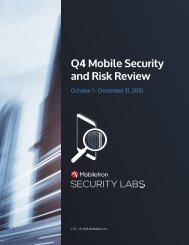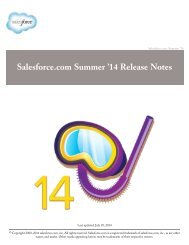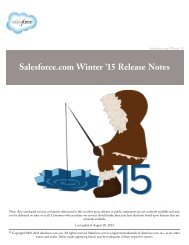salesforce_security_impl_guide
salesforce_security_impl_guide
salesforce_security_impl_guide
You also want an ePaper? Increase the reach of your titles
YUMPU automatically turns print PDFs into web optimized ePapers that Google loves.
Securing and Sharing Data<br />
Recalculating Sharing Rules<br />
• You can easily convert sharing rules that include Roles, Internal and Portal Subordinates to include Roles and Internal Subordinates<br />
instead by using the Convert Portal User Access wizard. Furthermore, you can use this wizard to convert any publicly accessible<br />
report, dashboard, and document folders to folders that are accessible by all users except for portal users.<br />
Recalculating Sharing Rules<br />
When you make changes to groups, roles, and territories, sharing rules are usually automatically<br />
reevaluated to add or remove access as necessary. Changes could include adding or removing<br />
individual users from a group, role, or territory, changing which role a particular role reports to,<br />
changing which territory a particular territory is subordinate to, or adding or removing a group from<br />
within another group.<br />
Note: You don’t have to recalculate each time you edit or create a new sharing rule. The<br />
Recalculate buttons on the Sharing Rules related lists should only be used if sharing rule<br />
updates have failed or are not working as expected. The administrator will receive a notification<br />
email if sharing rule updates have failed.<br />
To manually recalculate an object’s sharing rules:<br />
1. From Setup, click Security Controls > Sharing Settings.<br />
2. In the Sharing Rules related list for the object you want, click Recalculate.<br />
3. If you want to monitor the progress of a recalculation, from Setup, click Monitoring ><br />
Background Jobs or Jobs > Background Jobs.<br />
Note: The Recalculate button is disabled when group membership or sharing rule<br />
calculations are deferred.<br />
When sharing is recalculated, Salesforce also runs all Apex sharing recalculations.<br />
Automatic sharing rule calculation is enabled by default. You can defer sharing rule calculation by<br />
suspending and resuming at your discretion.<br />
EDITIONS<br />
Account and contact sharing<br />
rules are available in:<br />
Professional, Enterprise,<br />
Performance, Unlimited,<br />
and Developer Editions<br />
Account territory, case, lead,<br />
and opportunity sharing<br />
rules are available in:<br />
Enterprise, Performance,<br />
Unlimited, and Developer<br />
Editions<br />
Campaign sharing rules are<br />
available in Professional<br />
Edition for an additional cost,<br />
and Enterprise,<br />
Performance, Unlimited,<br />
and Developer Editions<br />
Custom object sharing rules<br />
are available in: Enterprise,<br />
Performance, Unlimited,<br />
Developer, and<br />
Database.com Editions.<br />
USER PERMISSIONS<br />
To recalculate sharing rules:<br />
• “Manage Sharing”<br />
Asynchronous Parallel Recalculation of Sharing Rules<br />
Speed up sharing rule recalculation by running it asynchronously and in parallel.<br />
When you create, update, or delete sharing rules, the resulting recalculation is now processed<br />
asynchronously and in parallel. The recalculation is run in parallel and asynchronously in the<br />
background, which speeds up the process and provides better resilience to site operations such as<br />
patches and server restarts. You’ll receive an email notification upon completion. Before the<br />
recalculation is completed, you can’t run other sharing operations such as creating a sharing rule<br />
or updating the organization-wide defaults.<br />
Parallel sharing rule recalculation is also run in these cases.<br />
EDITIONS<br />
Available in:<br />
• Professional<br />
• Enterprise<br />
• Performance<br />
• Unlimited<br />
• Developer<br />
68






